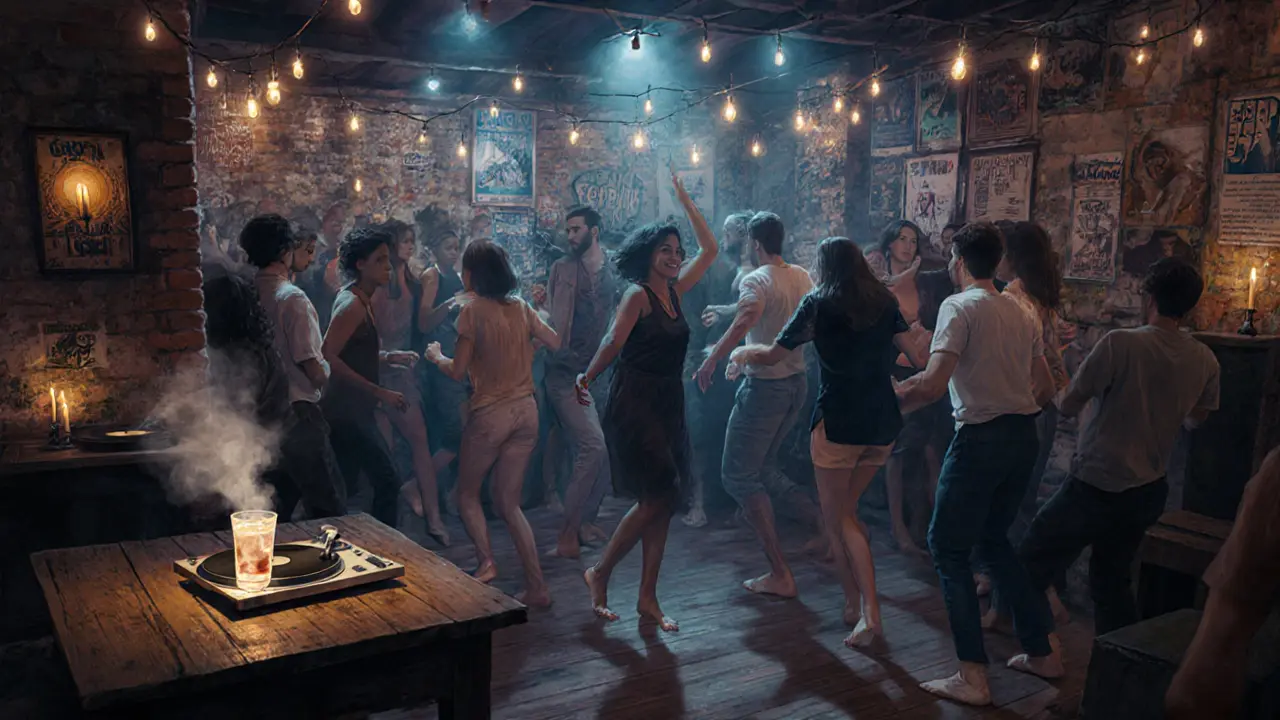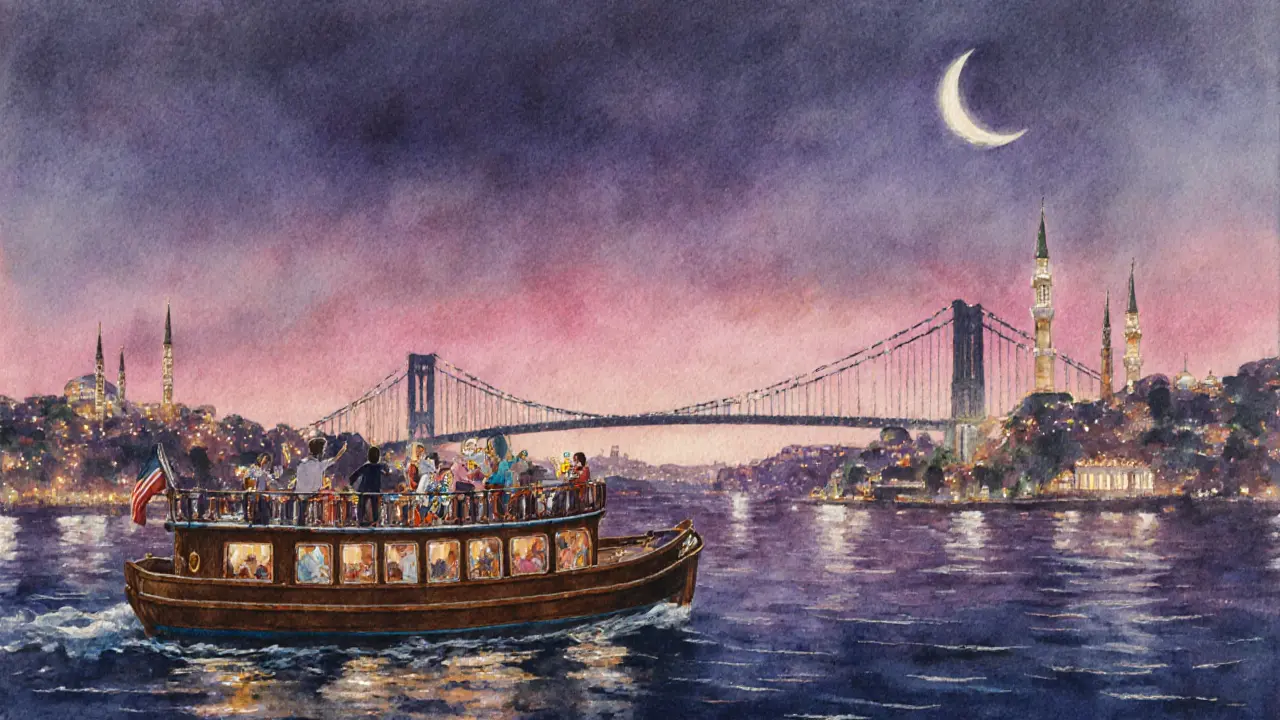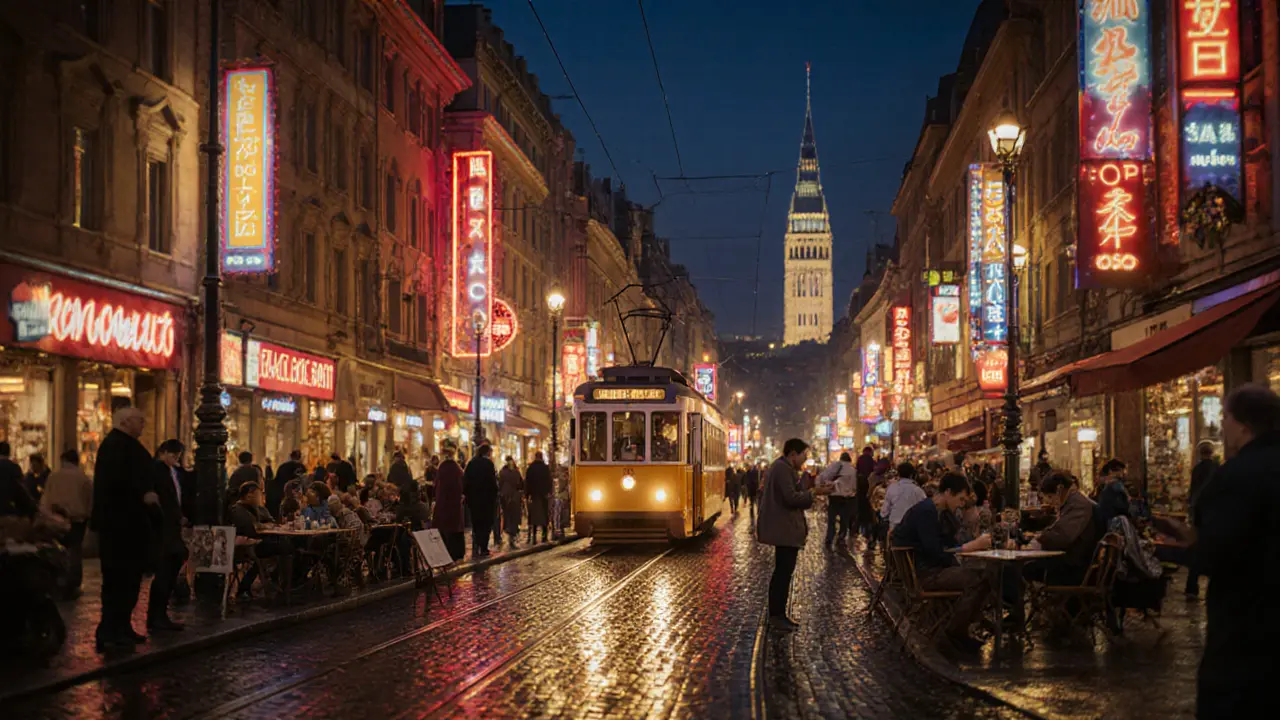Istanbul doesn’t shut down when the sun goes down. While other cities quiet down after midnight, Istanbul’s streets hum with music, laughter, and the clink of glasses well into the early hours. You don’t just go out here-you dive into a rhythm that’s been beating for centuries, blending Ottoman elegance with modern edge. Whether you’re sipping raki on a rooftop with the Bosphorus glowing behind you or dancing till dawn in a basement club tucked beneath a 19th-century mansion, Istanbul’s nightlife isn’t a list of venues. It’s a living, breathing experience.
Where the Night Begins: Beyoğlu and İstiklal Avenue
Start your night in Beyoğlu, where İstiklal Avenue turns into a human river after 8 p.m. This pedestrian street, lined with historic trams, art galleries, and neon-lit cafes, is the city’s heartbeat after dark. It’s not just about drinking-it’s about being seen, heard, and felt. Local bands play jazz in hidden courtyards. Street artists sketch portraits in seconds. You’ll find students debating philosophy over Turkish coffee, expats sipping craft beer, and grandmothers buying simit from the same vendor they’ve visited for 40 years.
Don’t miss the side alleys. Turn left off İstiklal onto Cihangir Street and you’ll stumble into Bar 1915, where the cocktails are named after Turkish poets and the walls are covered in vintage film posters. Or head to Leb-i Derya, a rooftop bar with panoramic views of the Golden Horn. The music here is smooth, the vibe relaxed, and the service feels personal-not corporate.
The Underground Scene: Karaköy and Galata
If Beyoğlu is the face of Istanbul’s night, Karaköy and Galata are its soul. These neighborhoods are where the real music lovers, DJs, and artists gather. Walk down the narrow stone streets of Galata and you’ll hear techno bleeding from basement doors. These aren’t clubs with bouncers and velvet ropes-they’re warehouses, old printing shops, and converted synagogues turned into sound temples.
Reina is the name everyone knows, but locals whisper about Bar 10 or Yeni Asmali Mescit, where the DJ plays deep house until sunrise and the crowd is a mix of Turkish musicians, Berlin expats, and curious tourists who found it by accident. The vibe? No dress code. No pretense. Just good music and people who’ve been waiting all week for this night.
On weekends, the area around Galata Tower becomes a festival. Street performers, food carts selling grilled corn and simit, and spontaneous drum circles turn the streets into a spontaneous party. You don’t plan to go here-you just show up and let the night pull you in.
Traditional Nights: Meze, Raki, and the Ottoman Legacy
Not every night in Istanbul needs bass-heavy beats. Some nights call for slow sips of raki, plates of meze, and the sound of oud drifting from a corner. Head to Çiya Sofrası in Kadıköy, where the food is as legendary as the atmosphere. Or try Asitane, a restaurant that recreates Ottoman court dishes with ingredients from 15th-century recipes.
At Asmalı Mescit, you’ll find locals sitting shoulder-to-shoulder on wooden benches, sharing small plates of stuffed grape leaves, fried zucchini, and spicy eggplant. The raki is served with a glass of water on the side-mix it yourself, watch it turn milky white, and take your time. This isn’t a bar. It’s a ritual. And it’s one of the most authentic ways to experience Istanbul after dark.

Boat Parties and Bosphorus Nights
Imagine dancing on a wooden boat, the city lights reflecting off the water, the call to prayer echoing softly from the minarets in the distance. That’s a Bosphorus night cruise. Companies like Boat Istanbul and Golden Horn Cruises run nightly parties that start at 10 p.m. and end at 2 a.m. The music shifts from Turkish pop to international hits, and the drinks flow freely.
These aren’t tourist traps. The boats are small, the crowds are real, and the views are unmatched. You’ll see couples kissing under the Bosphorus Bridge, friends laughing as the boat passes the Rumeli Fortress, and solo travelers snapping photos of the skyline changing color with the moonrise.
Book ahead. These fill up fast. And if you want the best seat, go for the upper deck. The wind, the music, the water-it all combines into something you won’t forget.
When to Go and What to Avoid
Istanbul’s nightlife peaks on Fridays and Saturdays. That’s when the city explodes. But if you want something quieter, go midweek. Wednesdays in Karaköy are perfect for discovering new DJs. Sundays feel like a slow exhale-many clubs close early, but the cafes stay open, and the energy shifts to conversation over tea.
Avoid the big-name clubs on İstiklal that target tourists with cover charges and overpriced cocktails. Places like Klub 11 or Maxx Royal are loud, crowded, and generic. You’ll pay €30 just to get in, and the music could be anywhere from Miami to Manchester.
Instead, follow the locals. Ask a bartender where they go after their shift. Look for places with no sign, just a line of people waiting. That’s usually the real spot.

What to Wear, How to Get Around
Dress smart-casual. No shorts, no flip-flops in upscale spots. Jeans and a nice shirt work everywhere. Women aren’t required to cover up-this isn’t a religious rule, it’s a social one. But modesty is respected, especially in traditional meze bars.
Transportation after midnight? The metro runs until 1 a.m., but the fun doesn’t stop then. Use BiTaksi, the local ride-share app. It’s cheaper than Uber and the drivers know the hidden spots. Taxis are everywhere, but make sure the meter is on. Never agree to a flat rate unless you’ve checked the price first.
Why Istanbul’s Nightlife Is Different
Other cities have nightlife. Istanbul has soul. It’s the only place where you can sip tea with a 70-year-old poet at 2 a.m., then walk three blocks and find a DJ spinning underground techno in a former synagogue. It’s the city where the call to prayer and a bass drop coexist without conflict.
This isn’t about partying. It’s about connection. The kind that happens when you’re tired, a little drunk, and realize you’ve made friends with someone who speaks no English-but you both understand the music, the rhythm, the silence between beats.
Istanbul doesn’t sleep because it doesn’t have to. The night here isn’t an escape from the day. It’s the next chapter.
Is Istanbul nightlife safe for tourists?
Yes, Istanbul’s nightlife is generally safe for tourists, especially in popular areas like Beyoğlu, Karaköy, and along the Bosphorus. Police presence is visible on weekends, and most clubs and bars have security. Avoid isolated streets late at night, don’t carry large amounts of cash, and use licensed taxis or BiTaksi. Petty theft is rare, but pickpockets can be active on crowded İstiklal Avenue-keep your bag zipped and your phone secure.
What’s the legal drinking age in Istanbul?
The legal drinking age in Turkey is 18. You’ll be asked for ID at most bars and clubs, even if you look older. Bring your passport or a copy of your ID. Alcohol sales are banned between 10 p.m. and 6 a.m. in convenience stores, but bars and restaurants can serve until closing. Some districts have local restrictions, so always check the venue’s policy.
Do I need to speak Turkish to enjoy Istanbul’s nightlife?
No, you don’t need to speak Turkish. Most bartenders, club staff, and taxi drivers in tourist areas speak basic English. But learning a few phrases like "Teşekkür ederim" (Thank you) or "Bir şey istiyorum" (I’d like something) goes a long way. Locals appreciate the effort, and it often leads to better service or even an invitation to join a table. In underground spots, a smile and a nod can be enough.
What’s the best time to start a night out in Istanbul?
Istanbul moves slower than Western cities. Dinner starts at 9 p.m., drinks at 10, and clubs don’t really fill up until 1 a.m. If you show up at midnight expecting a packed dance floor, you’ll be disappointed. Start with dinner and drinks in Beyoğlu, then head to Karaköy or Galata after midnight. The real party begins after 2 a.m.-and ends around sunrise.
Are there any cultural rules I should follow at night?
Istanbul is secular, but it’s still a Muslim-majority country. Avoid public drunkenness or overly loud behavior near mosques, especially during prayer times. Don’t take photos of people without asking, especially in traditional meze bars. Dress modestly in quieter neighborhoods. And never refuse a drink if offered-it’s seen as rude. If you don’t want to drink, say "Şu an değil" (Not right now) and offer to buy the next round.

